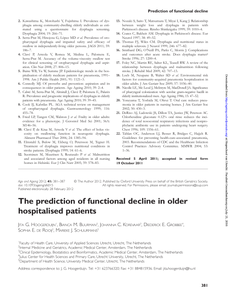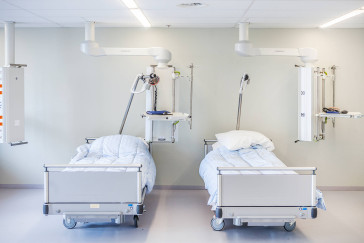A growing number of older patients undergo cardiac surgery. Some of these patients are at increased risk of post-operative functional decline, potentially leading to reduced quality of life and autonomy, and other negative health outcomes. First step in prevention is to identify patients at risk of functional decline. There are no current published tools available to predict functional decline following cardiac surgery. The objective was to validate the identification of seniors at risk—hospitalised patients (ISAR-HP), in older patients undergoing cardiac surgery. A multicenter cohort study was performed in cardiac surgery wards of two university hospitals with follow-up 3 months after hospital admission. Inclusion criteria: consecutive cardiac surgery patients, aged ≥65. Functional decline was defined as a decline of at least one point on the Katz ADL Index at follow-up compared with preadmission status.
DOCUMENT

Thirty to sixty per cent of older patients experience functional decline after hospitalisation, associated with an increase in dependence, readmission, nursing home placement and mortality. First step in prevention is the identification of patients at risk. The objective of this study is to develop and validate a prediction model to assess the risk of functional decline in older hospitalised patients.
DOCUMENT

Het Stroke Cohort Outcomes of REhabilitation (SCORE)-onderzoek bestaat tien jaar. Dit observationele onderzoek van Basalt volgt patiënten met een beroerte. Aanvankelijk was het doel om uitkomsten, praktijkvariatie in proces en structuur, en kosten te meten. Momenteel is het onderzoek meer gericht op meeteigenschappen van nieuwere Patient-Reported Outcome Measures (PROMs). In dit artikel geven we een overzicht van de resultaten van het SCORE-onderzoek met gerichte aanbevelingen en blikken we vooruit.
DOCUMENT

Veel ouderen ervaren tijdens en na ziekenhuisopname functieverlies. ‘Function Focused Care in Hospital’, ook wel bekend als bewegingsgerichte zorg, is een interventie gericht op het voorkomen en verminderen van functieverlies bij ouderen tijdens een ziekenhuisopname. Verpleegkundigen moedigen patiënten aan tot actieve betrokkenheid in de dagelijkse zorgmomenten.

Veel ouderen ervaren tijdens en na ziekenhuisopname functieverlies. ‘Function Focused Care in Hospital’, ook wel bekend als bewegingsgerichte zorg, is een interventie gericht op het voorkomen en verminderen van functieverlies bij ouderen tijdens een ziekenhuisopname. Verpleegkundigen moedigen patiënten aan tot actieve betrokkenheid in de dagelijkse zorgmomenten.Doel Doel van dit project is de effectiviteit bepalen van Function Focused Care in Hospital op het fysiek functioneren van patiënten die opgenomen zijn in de Nederlandse ziekenhuizen. Resultaten Nederlandstalig scholingsprogramma en handboek van de Function Focused Care in Hospital-benadering voor de ziekenhuissetting; Een evaluatie van het proces en de uitkomsten van de Function Focused Care-benadering. Looptijd 01 november 2020 - 31 oktober 2025 Aanpak Er is een haalbaarheidsstudie uitgevoerd, die uitwees dat de interventie geschikt is voor de Nederlandse praktijk. Op de neurologische en geriatrische afdelingen van drie ziekenhuizen is Function Focused Care in Hospital in de dagelijkse zorg geïmplementeerd en geëvalueerd op effectiviteit. Over de interventie Function Focused Care (FFC) is een zorgbenadering waarin verpleegkundigen patiënten actief betrekken bij alle zorgmomenten om hun fysiek functioneren te optimaliseren. Eerder onderzoek heeft laten zien dat FFC een positief effect heeft op fysieke activiteit, mobiliteit en ADL bij ouderen in de wijk en de langdurige zorg. Ook laten studies in de acute zorg belovende resultaten zien van FFC op fysieke activiteit en mobiliteit bij ouderen opgenomen in het ziekenhuis. Voorbeelden van zorg volgens de FFC-benadering zijn met de patiënt naar de badkamer lopen in plaats van wassen op bed, of de maaltijd aan tafel nuttigen in plaats van zittend in bed eten. De essentie van FFC is het behouden of, indien mogelijk, verbeteren van het fysieke functioneren. Tijdens de hele ziekenhuisopname wordt de patiënt aangemoedigd meer tijd te laten besteden aan fysieke activiteit op een op de patiënt aangepast niveau. Co-financiering Het project wordt mede gefinancierd door ZonMW, projectnummer 520002003.
The focus of this project is on improving the resilience of hospitality Small and Medium Enterprises (SMEs) by enabling them to take advantage of digitalization tools and data analytics in particular. Hospitality SMEs play an important role in their local community but are vulnerable to shifts in demand. Due to a lack of resources (time, finance, and sometimes knowledge), they do not have sufficient access to data analytics tools that are typically available to larger organizations. The purpose of this project is therefore to develop a prototype infrastructure or ecosystem showcasing how Dutch hospitality SMEs can develop their data analytic capability in such a way that they increase their resilience to shifts in demand. The one year exploration period will be used to assess the feasibility of such an infrastructure and will address technological aspects (e.g. kind of technological platform), process aspects (e.g. prerequisites for collaboration such as confidentiality and safety of data), knowledge aspects (e.g. what knowledge of data analytics do SMEs need and through what medium), and organizational aspects (what kind of cooperation form is necessary and how should it be financed).
Centre of Expertise, part of Breda University of Applied Sciences, NHL Stenden Hogeschool, HZ University of Applied Sciences

Centre of Expertise, part of Hanze
Lectorate, part of NHL Stenden Hogeschool